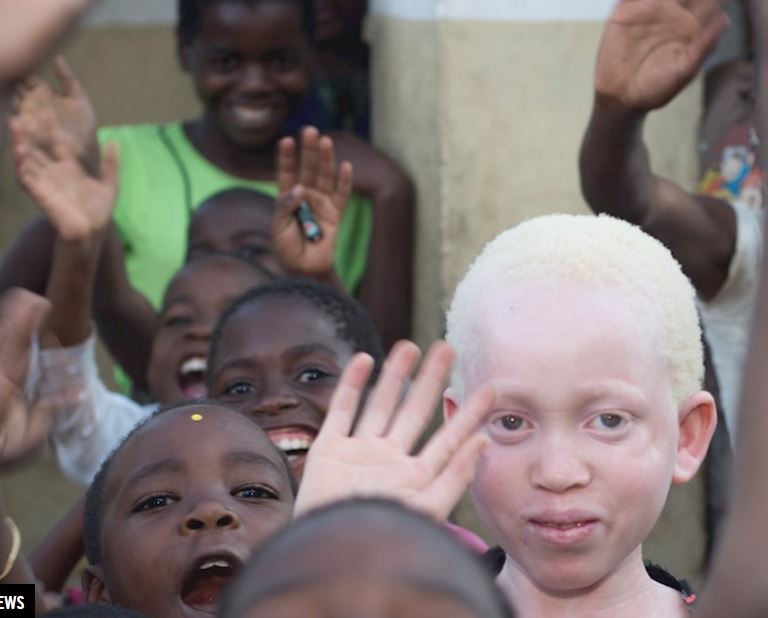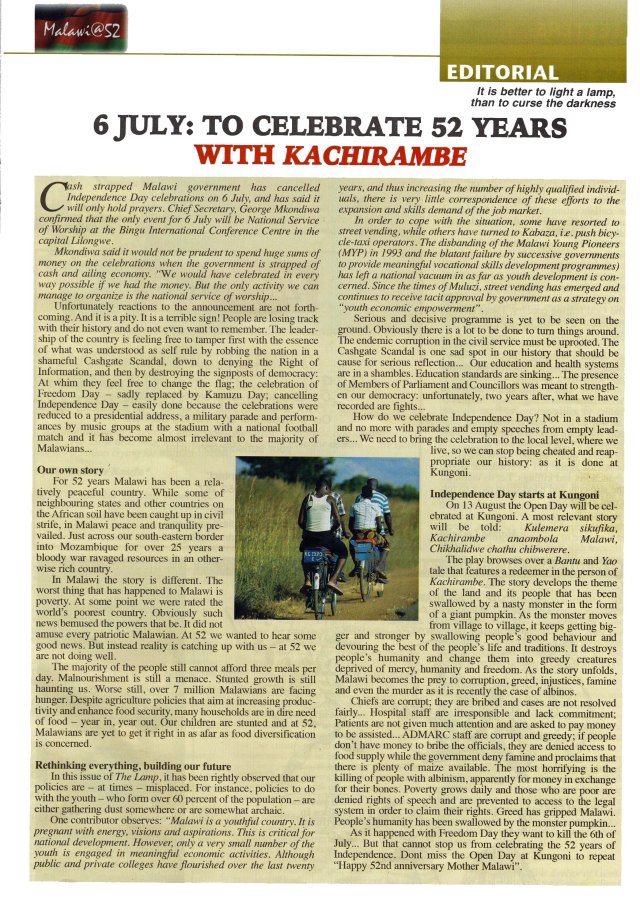KULEMERA SIKUFIKA, KACHIRAMBE ANAOMBOLA MALAWI, CHIKHALIDWE CHATHU CHIBWERERE = “Accumulating wealth is not the only purpose worth to live for”.
Malawi is not to be considered as a poor beggar who keeps stretching the hand but is very rich of spirituality that can be shared with the rest of the world especially with regard to our common humanity.
The play browse over a Bantu and Yao tale that feature a redeemer in the person of Kachirambe.
The story developed the theme of the land and its people that has been swallowed by a nasty monster in the form of a giant pumpkin. All except a young girl and her mother who escaped and lived hidden in the forest.
As the monster moves from village to village, it keeps getting bigger and stronger by swallowing people’s good behaviour and devouring the best of the people’s life and traditions. It destroys people’s humanity and change them into greedy creatures deprived of mercy, humanity and freedom. As the story unfolds, Malawi becomes the prey to corruption, greed, injustices, famine and even the murder as it is recently the case of albinos.
 Chiefs are corrupt; they are bribed and cases are not resolved fairly. They are selling land to rich investors while the custodians of the land are left with little or no land to cultivate. Hospital staff are irresponsible and lack commitment; patients are not given much attention and are asked to pay money to be assisted. ADMARC staff are corrupt and greedy; if people don’t have money to bribe the officials, they are denied access to food supply while the government deny of famine and proclaim that there is plenty of maize available. The most horrifying is the killing of people with albinism, apparently for money in exchange for their bones. Poverty grows daily and those who are poor are denied rights of speech and are prevented to access to the legal system in order to claim their rights. Greed has gripped Malawi. People’s humanity have been swallowed by the monster pumpkin.
Chiefs are corrupt; they are bribed and cases are not resolved fairly. They are selling land to rich investors while the custodians of the land are left with little or no land to cultivate. Hospital staff are irresponsible and lack commitment; patients are not given much attention and are asked to pay money to be assisted. ADMARC staff are corrupt and greedy; if people don’t have money to bribe the officials, they are denied access to food supply while the government deny of famine and proclaim that there is plenty of maize available. The most horrifying is the killing of people with albinism, apparently for money in exchange for their bones. Poverty grows daily and those who are poor are denied rights of speech and are prevented to access to the legal system in order to claim their rights. Greed has gripped Malawi. People’s humanity have been swallowed by the monster pumpkin.
The only survivors in our tale are a young girl called “Ndasiyidwa” (meaning; I was spared) and her mother called “Ndapulumuka” (meaning; I have survived). Ndasiyidwa was expecting a child. One day while Ndasiyidwa was busy collecting mushrooms in the forest, she took by accident a hyena’s egg and brought it home. The mother of Ndasiyidwa destroyed the egg by throwing it in the fire. The next day when the girl was collecting wild vegetables, she encountered the hyena for the first time and it asked who took its egg. Ndasiyidwa acknowledged that she was the one took the egg and that her mother had destroyed it in the fire. The hyena threatened that it will eat her. Ndasiyidwa told the hyena that she was expecting a baby soon and that it should eat the child instead of her. The hyena complied. Ndasiyidwa delivered her child, fully grown and equipped with weapons of a hunter. Her grandmother called him Kachirambe Mlera khungwa (meaning; the guardian of the people). Ndasiyidwa informed the hyena on her first trip to the forest that she had conceived her child, but that the child was so clever that the hyena could not come to term with it and that the hyena would fail to eat him. The hyena tried again and again to grab Kachirambe but failed. Instead Kachirambe killed the hyena and delivered his mother and grandmother from their common enemy.
One day as Kachirambe was chatting with his mother, he asked her what had happened to his dad. Ndasiyidwa told him that his father was devoured by the monster pumpkin called Mgalika mwambo (meaning; the swallower of tradition). Kachirambe swore that he will get rid of the monster pumpkin as he did with the hyena and enquired where the monster was hiding. Ndasiyidwa told him that it was hiding in the lake. The hero over the hyena Kachirambe, went for it and fought it with all his strength. He weakened it with his arrows and in the end he cut it open with his father’s dagger and freed all those who had been swallowed. His father on behalf of all the other victims, acknowledged that he had been greedy and selfish. He promised that he would return to the tradition and become more human. He would take seriously the advice of his ancestors. Money does not ultimately fulfil all of human aspirations.
The play ends with the great mother of the Chewa “Kasiya maliro” who condemns those who have gone astray through greed and lost their humanity and their own tradition. One has to live from his own values and not imitating the behaviour of others. Kachirambe portrays the power of Malawian culture over and against other influences that can disrupt Malawian culture and tradition if one is not deeply rooted into his own. Once Malawi has lost her own humanity, it has also lost the privilege of being called Malawian.

